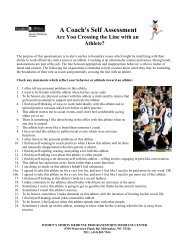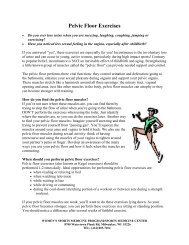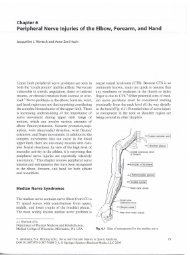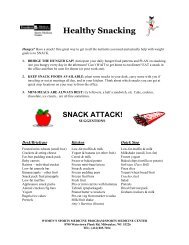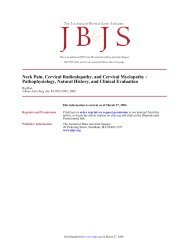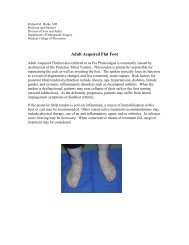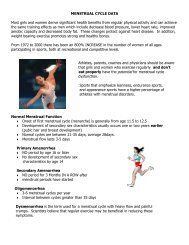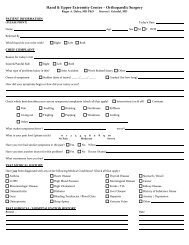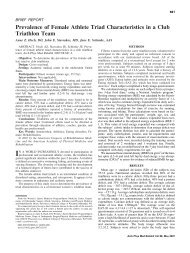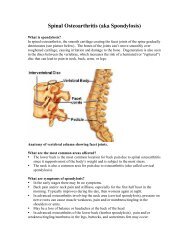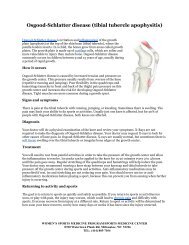The athletic triangle, consisting of the coach, athlete and parent(s), is ...
The athletic triangle, consisting of the coach, athlete and parent(s), is ...
The athletic triangle, consisting of the coach, athlete and parent(s), is ...
You also want an ePaper? Increase the reach of your titles
YUMPU automatically turns print PDFs into web optimized ePapers that Google loves.
Parent, Coach <strong>and</strong> Child:<br />
<strong>The</strong> Athletic Triangle<br />
<strong>The</strong> <strong>athletic</strong> <strong>triangle</strong>, <strong>cons<strong>is</strong>ting</strong> <strong>of</strong> <strong>the</strong> <strong>coach</strong>, <strong>athlete</strong> <strong>and</strong> <strong>parent</strong>(s), <strong>is</strong> a<br />
natural aspect <strong>of</strong> <strong>the</strong> youth sport setting. <strong>The</strong> <strong>coach</strong>'s <strong>and</strong> <strong>parent</strong>s' roles in<br />
th<strong>is</strong> process are critical to <strong>the</strong> success <strong>of</strong> any program. If <strong>parent</strong>s <strong>and</strong> <strong>coach</strong>es<br />
allow <strong>the</strong>ir roles to take priority, <strong>the</strong>n we have an upside-down <strong>triangle</strong> that<br />
<strong>is</strong> referred to as <strong>the</strong> pr<strong>of</strong>essional model. In <strong>the</strong> pr<strong>of</strong>essional model, <strong>the</strong> adults form <strong>the</strong> upper two-thirds <strong>of</strong> <strong>the</strong><br />
<strong>triangle</strong> with <strong>the</strong> <strong>athlete</strong>s (<strong>the</strong> focal point <strong>of</strong> <strong>the</strong> <strong>triangle</strong>) attempting<br />
to balance <strong>the</strong> adults. In th<strong>is</strong> model, <strong>the</strong> emphas<strong>is</strong> <strong>is</strong> placed on<br />
CHILD<br />
winning <strong>and</strong> it <strong>is</strong> easy to lose sight <strong>of</strong> <strong>the</strong> needs <strong>and</strong> interests <strong>of</strong> <strong>the</strong><br />
young <strong>athlete</strong>.<br />
However, in <strong>the</strong> right-side-up <strong>triangle</strong>, or developmental model,<br />
adults (<strong>coach</strong>es <strong>and</strong> <strong>parent</strong>s) are supporting <strong>the</strong> young <strong>athlete</strong>s.<br />
Sport programs using th<strong>is</strong> approach remain child-centered <strong>and</strong> do<br />
not become adult-dominated. In <strong>the</strong> developmental model, <strong>parent</strong>s<br />
<strong>and</strong> <strong>coach</strong>es work toge<strong>the</strong>r to provide a quality experience. In th<strong>is</strong> COACHES<br />
setting, effective communication between <strong>coach</strong>es <strong>and</strong> <strong>parent</strong>s<br />
allows for each group to complete <strong>the</strong>ir respective roles <strong>and</strong> responsibilities.<br />
SPORT<br />
PARENTS<br />
While some <strong>parent</strong>s may intuitively underst<strong>and</strong> <strong>the</strong>ir responsibilities, or through past experiences with o<strong>the</strong>r<br />
children may have been informed about <strong>the</strong>m, o<strong>the</strong>r <strong>parent</strong>s do not know. Instead <strong>of</strong> becoming frustrated with<br />
<strong>parent</strong>s for not underst<strong>and</strong>ing <strong>the</strong>ir responsibilities, take time to educate (or review) <strong>the</strong>se responsibilities during<br />
orientation. Parents who underst<strong>and</strong> <strong>the</strong>ir role or responsibilities are much more likely to be supportive <strong>of</strong> <strong>the</strong><br />
<strong>coach</strong> - so <strong>the</strong> focus <strong>of</strong> <strong>the</strong> sport experience can be placed on <strong>the</strong> needs <strong>and</strong> interests <strong>of</strong> <strong>the</strong> young <strong>athlete</strong>s.<br />
ELEVEN DIFFERENT PARENT RESPONSIBILITIES HAVE BEEN HIGHLIGHTED<br />
1. Children's Rights - Children have <strong>the</strong> right to participate in sport; th<strong>is</strong> also includes <strong>the</strong> right not to<br />
participate. It <strong>is</strong> okay to encourage a child to participate, but do not pressure, intimidate or bribe a child<br />
into playing a sport or position.<br />
2. Guide Selection - Counsel your child about <strong>the</strong> competitive level or type <strong>of</strong> sport. For example, if a child<br />
wants to try out for a traveling team, make sure <strong>the</strong> child underst<strong>and</strong>s <strong>the</strong><br />
team may travel every weekend for <strong>the</strong> next two months <strong>and</strong> in addition,<br />
practices at least 3-4 times a week. If <strong>the</strong>re are financial <strong>is</strong>sues associated<br />
with a sport selection, <strong>the</strong>n <strong>the</strong> <strong>parent</strong> needs to address <strong>the</strong>m with <strong>the</strong><br />
child.<br />
3. Respect <strong>the</strong> Child's Dec<strong>is</strong>ion - Support <strong>the</strong> child's dec<strong>is</strong>ion.<br />
4. Monitor <strong>the</strong> Child's Participation - What new skills has <strong>the</strong> child<br />
learned Is <strong>the</strong> child having problems sleeping at night before a "big"<br />
game Is <strong>the</strong>re any change in <strong>the</strong> child's attitude about participating in <strong>the</strong><br />
activity<br />
5. Entrust <strong>the</strong> Child to Coach - Trust ano<strong>the</strong>r adult to guide <strong>the</strong> child's<br />
sport experience. It also involves accepting someone else's authority.<br />
WOMEN’S SPORTS MEDICINE PROGRAM/SPORTS MEDICINE CENTER<br />
8700 Watertown Plank Rd, Milwaukee, WI 53226<br />
TEL: (414) 805-7104
6. Admit Shortcomings - When one makes a m<strong>is</strong>take, admit it. Demonstrate to children that everyone<br />
makes m<strong>is</strong>takes; teach <strong>the</strong> children that we can real<strong>is</strong>tically accept whatever limitations we have.<br />
7. Accept Triumphs - Regardless <strong>of</strong> <strong>the</strong> quality <strong>of</strong> a child's performance, can you accept <strong>the</strong> performance<br />
without critiquing it Accept a child's performance "as <strong>is</strong>" <strong>and</strong> don't continually seek more from <strong>the</strong> child.<br />
8. Accept D<strong>is</strong>appointments - Support your child when she <strong>is</strong> d<strong>is</strong>appointed or hurt; help her to look for <strong>the</strong><br />
positive in every situation.<br />
9. Be Supportive - Attend games/practices, if possible; <strong>the</strong>re are lots <strong>of</strong> ways <strong>of</strong> being supportive (e.g., ra<strong>is</strong>e<br />
funds, drive, keep score, etc.).<br />
10. Demonstrate Appropriate Behavior - Show self-control; be a role model for <strong>the</strong> child.<br />
11. Value Volunteer Coaches - Recognize <strong>the</strong> value <strong>and</strong> importance <strong>of</strong> volunteer <strong>coach</strong>es; support,<br />
encourage <strong>and</strong> appreciate <strong>the</strong>m, as <strong>the</strong>y are playing an important role in <strong>the</strong> child's life.<br />
TOP 10 QUESTIONS FOR PARENTS PLACING THEIR CHILD IN THE CARE/LEADERSHIP OF A<br />
COACH<br />
1. How much experience have you had in teaching children At what age(s)<br />
2. What has been your experience <strong>and</strong> background with th<strong>is</strong> sport<br />
3. What are some <strong>of</strong> <strong>the</strong> most significant differences (racial, d<strong>is</strong>ability, economic, social, etc.) you have<br />
experience dealing with while working in a team environment<br />
4. Why have you decided to be a <strong>coach</strong><br />
5. Who was <strong>the</strong> best <strong>coach</strong> you have ever been <strong>coach</strong>ed by why<br />
What <strong>coach</strong> do you most admire<br />
6. What role do you prefer for <strong>parent</strong>s to play within your team<br />
organization<br />
7. How will you h<strong>and</strong>le dec<strong>is</strong>ions on whom <strong>and</strong> how much each<br />
child will practice/compete<br />
8. What do you expect to accompl<strong>is</strong>h in each practice Is that <strong>the</strong> same expectation you have during<br />
competition<br />
9. What <strong>is</strong> your <strong>coach</strong>ing philosophy<br />
10. How do you continue to learn <strong>and</strong> improve as a <strong>coach</strong><br />
BONUS QUESTION: Where <strong>is</strong> <strong>the</strong> <strong>coach</strong>'s ego <strong>and</strong> needs in th<strong>is</strong> powerful environment<br />
Develop any questions you can think <strong>of</strong> to help you determine if th<strong>is</strong> person <strong>is</strong> a devoted child advocate who can<br />
swallow personal competitive drive <strong>and</strong> allow children/young adults to gain experience <strong>and</strong> develop in a positive<br />
way<br />
WOMEN’S SPORTS MEDICINE PROGRAM/SPORTS MEDICINE CENTER<br />
8700 Watertown Plank Rd, Milwaukee, WI 53226<br />
TEL: (414) 805-7104



